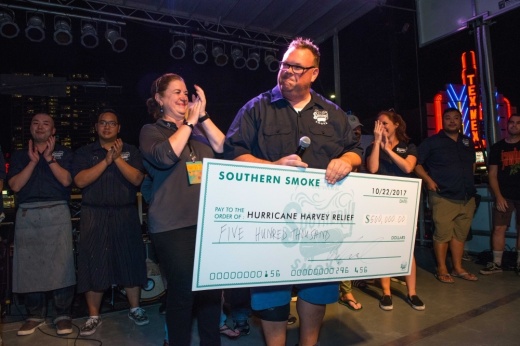How has Southern Smoke Foundation seen the need for financial relief grow?
We’ve had more applications than we ever had, so we've had to employ more people. In the past, we would do two to three applications a day. Right now, we're doing 400 to 500 applications a day. So it's more that we have to sift through what is a true medical emergency, versus just want or need, which is all very important as well. ... We've just started awarding finances, so that got that ball starting to move.
How damaging is this situation to people in the restaurant industry, and how does it differ between a mom-and-pop operation or a restaurant that is part of a chain?
Everything that you know now will probably not be there after this if we don't get assistance pretty quickly. Honestly, people better love national chains, because they can afford to do this, but anything small and independently owned is really going to have a massive crisis right now. I had to furlough 160-plus staff members, and all restaurants are having to layoff and do that as well. So what people know as their normal day-to-day neighborhood restaurant will probably not be there after this, and that's the honest truth. If we continue to go down this path without getting some kind of financial aid, it's just not going to exist. We're doing everything we can to try and keep the lights on and bills going through, and we're feeding our furloughed employees, but we're doing everything to fight to stay alive. I'll continue to do that until we can't go anymore.
Are you doing any kind of advocating for funding relief at any level of government?
I spoke to Sen. [John] Cornyn’s office. Have I ever done that before in my life? No. I’ll do what people asked me to do, and we'll try and figure this out together. It's just a real stressful time because I've spent 30 years in this business, and at some point, it may not be here anymore. I don't think people really understand that.
What kind of message do you want to give to people in Houston who are not in the restaurant industry about how they can help?
If you're following for a restaurant on Instagram, and they're asking you to contact your senators and your local congressperson, do that. If they're saying that they're doing takeout food, buy it. If they say, ‘Hey, maybe buy some gift cards,’ do that. That's instant cash for us to be able to hold onto because a lot of things, including TABC taxes are still coming in. I still have to pay those and I get no relief on that whatsoever. All of the insurance that I paid for business interruption over the years isn't coming through. ... If people can get takeout and donate to Southern Smoke, that's a fantastic way to help. It’s just being a part of your community and loving your neighbors. ... A lot of people are sitting at home, and that's where they should be. ... But let's be honest: So many people flooded the grocery stores and bought so much stuff that they will never know how to cook.
What do you say to customers who are worried that ordering takeout is not safe?
We keep it as clean as clean can be. I'm not going to do something that's going to put somebody else at risk. We're going to cook what we possibly can. We're setting up take-and-bakes. You can come in and buy something different for everybody in your family, and all you’ve got to do is throw [it] in the oven. We're limiting even more—so now, the hot, ready foods to eat—and focusing more on the things that you can bake yourself or salads. We want to become that grocery store for people.
Will restaurants be able to maintain supplies for takeout without spending too much?
You have to be forward-thinking, and you have to be able to know what's best for your business. At the end of the day, when this is all over, we still have to be a restaurant. Most of the restaurant offerings that we are doing are either priced normally or lower than normal.





